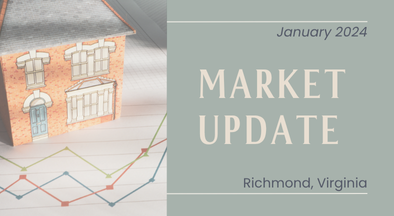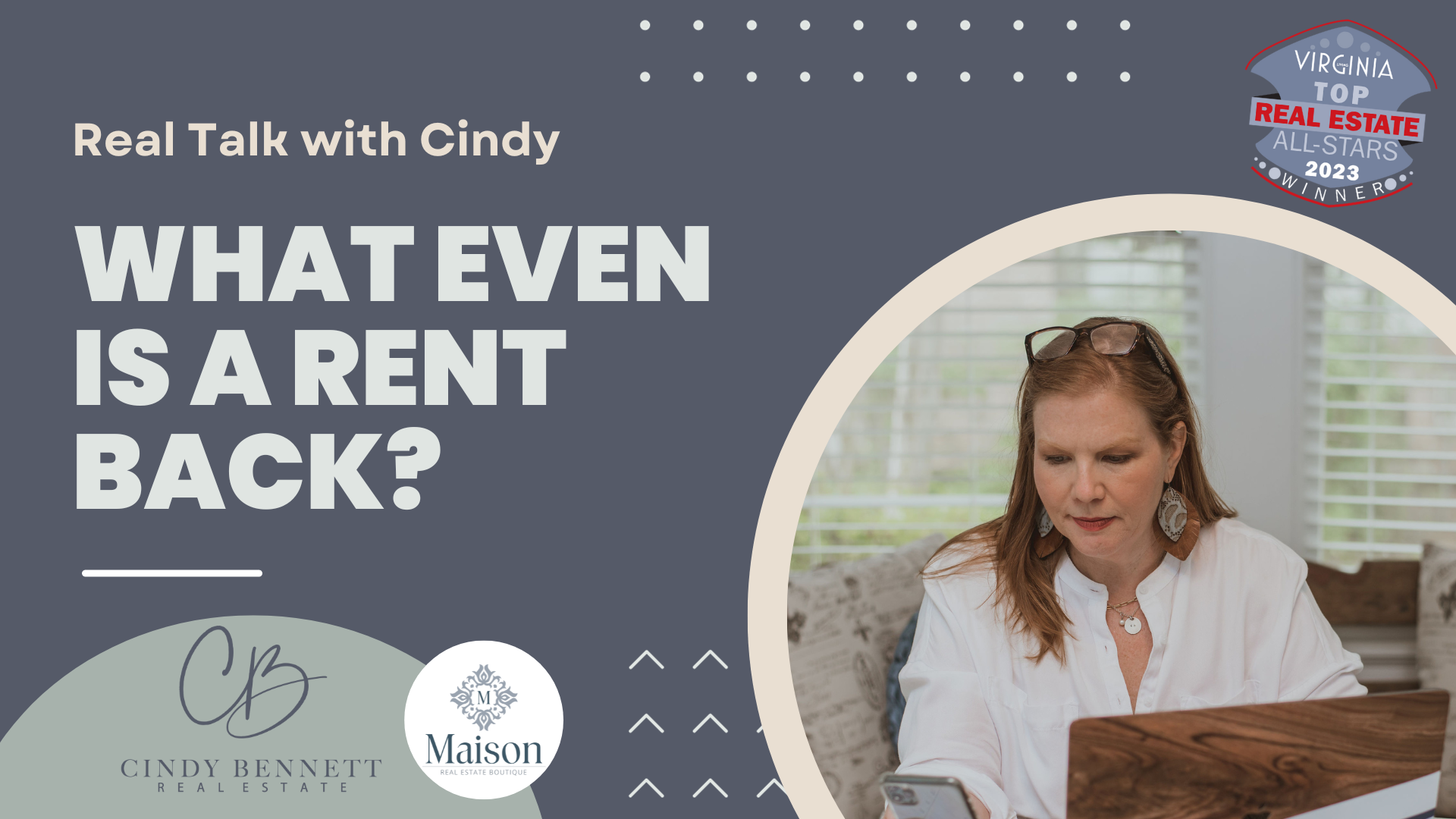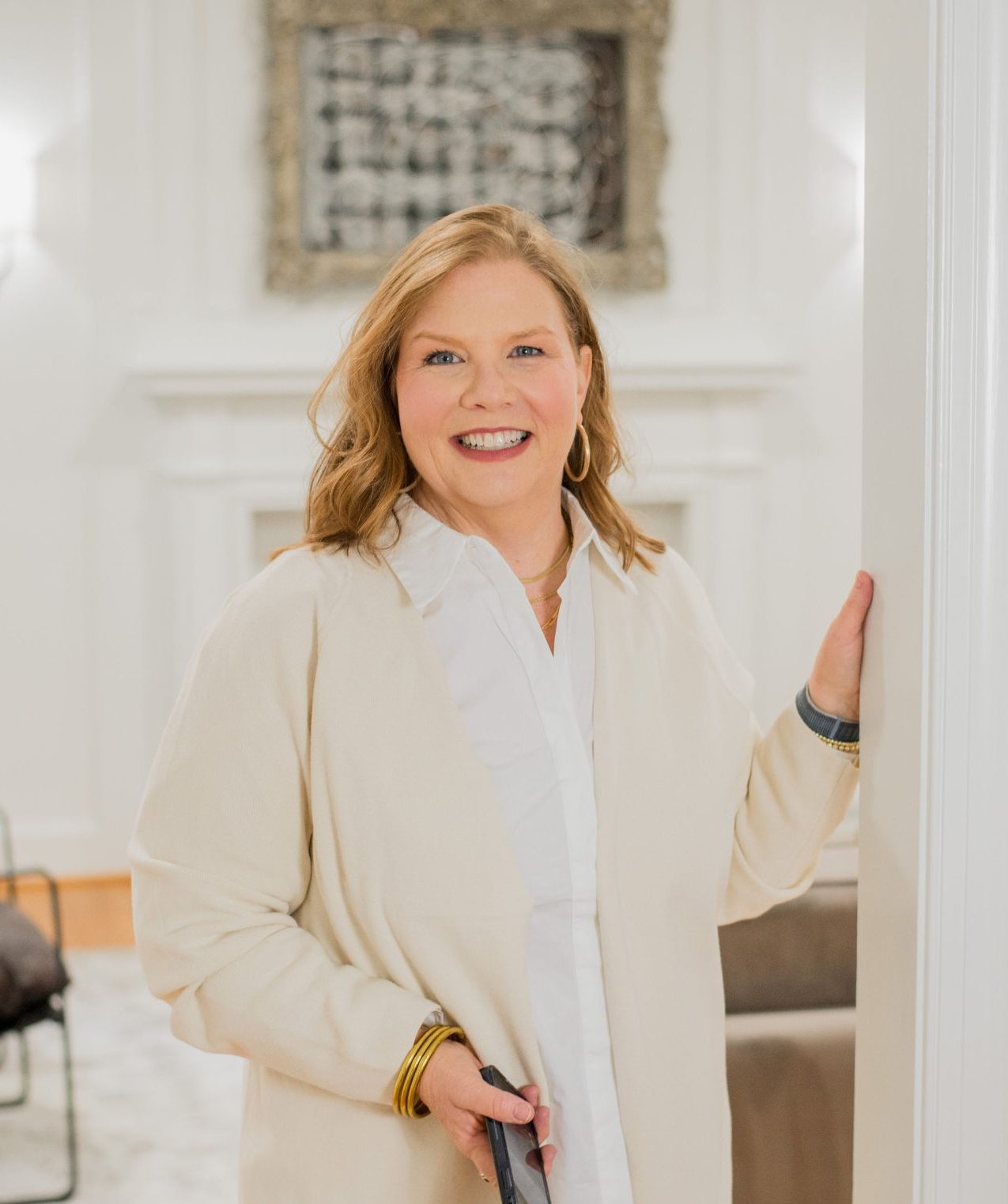Selling Your Home
Thinking of selling a home? The time to start the process is now (when you’ve just started thinking, rather than when you think you’re “ready”) Read up, or better yet, reach out, and get all your questions answered.

So we've talked a lot about whether it's a buyer's or seller's market and obviously all the data shows, and anecdotally, I can attest to the fact that it is still very much a seller's market here in central Virginia, in the metro Richmond area. But why? Why are we still in a seller's market? What is going on? And is it going to change? So a lot of buyers are out there thinking, I'm gonna wait, I'm gonna sit it out until it turns back into a buyers market. And I wouldn't really recommend that and there are a couple of reasons why. And they go back to the reasons why we are still in a seller's market. So one of the reasons why we are still in a seller's market, and we have not actually been in a buyer's market since 2013, or so, is throwing back to the mortgage crisis of '06 or '07, '08. When mortgages were crazy, everything kind of went kablooey. After lenders were giving people mortgages that probably shouldn't have gotten mortgages, and people didn't really have any skin in the game, so to speak. I think the lowest amount I had a buyer, during that time period, bring to closing was about $100. I think there were some people who brought $0 to closing and that just doesn't really give you a great incentive to pay things off. You don't have anything to lose if you walk away and just can't pay your mortgage. A lot of things changed after that period and put us in a position where a lot of builders went belly up. A lot of things just shifted in the whole industry. Buyers were sidelined. It was harder to get a mortgage. There were a whole lot of reasons, but one big piece of fallout that came from that was people stopped building. We just didn't have the construction that we had had up to that point and we just haven't caught up. So there are literally not as many housing units as the market needs nationwide. Everywhere you go. Almost anywhere, there are not enough units of housing. So that means rental homes, apartments, condos, townhomes, single-family homes, all that stuff. I have also seen during the course of my career that things have gotten a little different from the perspective of buyers. I think 15 or 20 years ago, buyers were more likely to come in and buy a fixer upper. I say all the time that with Pinterest, Instagram, HGTV, and all of these things showing great transformations, my natural thought would be that people would be more open to a fixer-upper and they would see the potential more because they've seen it on TV or Instagram or whatever. And it's almost the opposite. So it's a little counterintuitive to me that with the popularity of those things that buyers tend to walk in and see just a couple of things that might just be cosmetic, or just beyond cosmetic and they will walk out of a home. So the deals to be had in this market generally are the real fixer-uppers because a lot of people are just completely, no thank you, on those. They won't even go or they walk in and turn around and walk out. So there are a few reasons why we are still in a seller's market, but there are always deals to be had. If you're thinking of buying, there are always opportunities out there. So don't sit on the sidelines because you may be sitting for a long time. But if you have any questions about buying or thinking about a game plan to get you into a home and you think it's maybe unattainable, I'd love to talk to you because I bet you can actually make it happen.
Read more
One of the questions that I get asked all the time in every season, at a party by clients, whatever, "Are we in a buyers market or seller's market?". If you look at real estate news across the country that answer varies greatly from location to location, region to region, but here in central Virginia in the Richmond metro area, we are still in a seller's market. Now, what does that mean? That means that a balanced market is basically six months' worth of inventory. That means that if we had no more homes come on the market, that we would have six months to sell through all of the inventory that's currently on the market. So if a balanced market where it's not preferring or leaning towards buyers not leaning towards sellers, a balanced market is six months' worth of inventory. We are currently still, here in January of 2024, with less than two months of inventory. If we had no more homes come on the market with the buyers that are currently in the market, it would be at a zero within two months, like all of the houses would be sold. That's going to continue to a greater or lesser degree throughout 2024. We will still find ourselves in a seller's market. But with rates coming down, there are a lot more opportunities for buyers, especially first-time buyers or buyers who are very dependent on those rates. So if you're thinking about buying a home, reach out, I'd love to talk to you, and help you navigate that process, whether it's your first home or your tenth. And if you're thinking of selling, yes, it is still a great time to sell and I'd love to talk to you about the best strategy to get your home on the market before the spring when there is still pretty little competition right now. So give me a call, send me a message, and let's set up a time to chat.
Read more
If you're thinking about putting your home on the market, yes, even in the seller's market, there are always things that you can do to make it show a little bit better and make it a little bit more appealing to a larger pool of buyers, and that's always going to help you in the long run. One of the easiest things or the 'more easier' thing to DIY is going to be your outdoor space. Especially as we head into the fall in winter a lot of the competition is not going to be doing a lot to their outdoor space because everything starts to look gray and bed and cold and brown. Today's buyers place a premium on well-kept and well-built-out outdoor space. So especially heading into the fall and winter, it is a great way to put your listing ahead of the pack by making your outdoor space more appealing and approachable. In fact, in 2020, 26% of buyers that were surveyed, said that that outdoor space made a huge difference in them wanting to buy a particular home over another. This can look as simple as putting nicer furniture outside or just staging an area to show that it could be a great firepit or relaxing area in any season. If you're wondering about ways to help make your outdoor space a little bit more appealing, I'd love to come take a look at your home if you're in the Richmond area. Give you an idea of what you can do to make your outdoor space a little bit more appealing to potential buyers make your indoor space a little more appealing to potential buyers and help get you the most return on your investment in your home. Send me a message give me a call or shoot me an email and let's set up a time for me to come take a look at your space and help give you that list of things that you can do to make it a little bit more of a wow in the sometimes a little gloomy or fall in winter markets.
Read more
What NOT to fix if you're thinking of selling your home? So the first thing I'm always going to recommend is that you have a professional agent who is active and working in the market come take a look at your home, before you start making any repairs, or corrections, painting, etc, etc, because they are going to be able to put that to-do list into perspective for you. I do it all the time. After you have your agent come and put some things in perspective, that's going to really help you narrow down that to-do list. But here are a few things that you want to keep in mind, as you're maybe making the to-do list to discuss with your agent. Wipe the slate clean of all those vanity fixes things that you always wanted to do but never got around to. We always wanted to hang this fantastic chandelier, or maybe you wanted to put wallpaper in the bathroom. The new buyers do list is probably going to look different than yours and if it's just a cosmetic fix, and it's not actually repairing something, you probably want to just leave that up to them. Determine if you're going to recoup the cost of the repairs or corrections or improvements that you're thinking of doing. Because often you're not going to get the ROI from that item that you would hopefully get. So this is again, where it goes back to having a good agent that's going to help you narrow that list down. Sometimes you really are going to get a great ROI from switching out your faucets, your lighting in your bathroom, or maybe putting on a new coat of paint. If you're looking at retiling a whole bathroom or doing a total renovation of your kitchen, just to sell usually the ROI is usually not going to be there. Don't worry about items that are easy to remove like curtain rods or blinds, things like that, often just taking them down is going to be enough, you're not going to necessarily need to replace that whole situation. Doing a pre-inspection sometimes it's nice, it gives you an idea of what sort of condition the kind of underpinnings of your home are. But if you know that you've always had an outlet that just never worked, you don't necessarily need to fix that before you sell. Odds are that's going to come up on an inspection anyway and sometimes leaving those inspection items up to the potential buyer is going to be a better idea than fixing a list of 10 things before you sell only for their inspector to come up with 10 more. Obviously, if there are major issues, you want to take care of those. You don't want to have faulty electrical, faulty plumbing leaks, roof issues, or things of that nature. If you can solve those before you put it on the market, solve them. And if you know that they're there before you put it on the market and you can't afford to solve them, you definitely need to disclose those to the buyer before you make that transaction happen. Finally, you probably don't need to repair cracks in your driveway, cracks in your sidewalks or patio, or things like that. Unless they are really really big major deterrence or safety hazards, you are probably fine to leave those alone. And just as my father would say, leave it for the next guy. Hopefully, those things help you as you're putting together that list before you talk to an agent. But don't forget, having a licensed agent who actually works in the market and knows what your market is doing, take a look at your home before you start making that list or making those improvements is going to make a huge difference. So make sure that you're not doing things that aren't going to give you a return on your investment or that are just going to cost you a lot of work and not give you any money in return. As always, if you're in the Richmond area, I'd love to talk to you. I'm happy to come to help you determine what things to tackle in your home. I don't care how well maintained or poorly maintained your home is there is always going to be a list of things that are going to help you sell and market better to get you the most amount of money and that's what I'm here to do.
Read more
So you want to buy or sell a house, but you need a little breathing room and you don't know how you're going to work, the timing of that whole situation, especially in this market, what do you do? One way that we often handle these logistics of literally moving targets with closing dates, times moving trucks, people moving in people moving out is with a possession by seller or possession by purchaser agreement. But what are those? You may have heard that term, and sometimes the possession by the seller is actually called a rent back. That's our common vernacular for that document, or that situation. And it's called a rent back because basically, you as the seller are renting back your house after you close and the purchaser actually owns it. We do have another thing called a possession by the purchaser. That is very, very seldom used, because there are a lot of risks involved in letting a purchaser move into your house before you are actually close as you can imagine, they move in and they start putting wallpaper up or demoing the kitchen, and some reason, their deal does not close and you're stuck with whatever they did when they were in your house and you're also kind of stuck with them in your house, and you may accidentally become a landlord. We don't use those very often. The way that the possession by the seller works is literally just like the way you would rent a property. So you own the house, you know, you're going to close on, say the 10th of the month, but you need to stay in for an extra week or two, we're going to have a whole document that's basically a rental agreement where the purchaser closes, and then you're going to be renting that house back from them for the next week or two weeks, whatever. There is usually a deposit just in case you damage anything while you're moving or getting all your stuff out. And you are going to have to cover that if that happens. There's generally a per diem amount as well. So if you go past that, say, you're supposed to close on your new construction, this is one where sometimes the closing dates don't really line up the way we want them to say you're closing on new construction on the fifth of the month. And that's when your rent back ends on the house that you're leaving. But the builder isn't ready until the 10th, so you may have to pay extra, then for those additional days that you stay, or you may just have to beat it because sometimes the agreement was you're going to be out on the fifth and sometimes that's just what has to happen. All of this can get really confusing and sound really confusing. In reality, it's not that confusing, but a lot of it goes back to having a plan before you put your house on the market before you write the contract for the house that you fall in love with making sure that you sit down with your agent and kind of plan out that whole scenario. Sometimes hard when you're really emotional about this process or you're looking at all the other moving parts, but the times and the dates and all of that good stuff really get important, so having that plan is really key. I'd love to explain to you how that might work for you, so just give me a call send me an email, send me a message, and let's set up a time to chat.
Read more
Who pays for what in a transaction, seller addition? When you think about closing costs, as a buyer, there are lots and lots of fees that add up. But let's talk a little bit about if you're selling your home, what are you going to have to pay for, because it's not all just give me the money at the end of the day. So in the market that we're in, now we're seeing relatively little in the way of repair costs. So one of the big things or one of the big unknowns, perhaps when you're selling your home is if the buyer has an inspection, and they are able to ask for repairs, and you agree to do those repairs, what those are going to be costing you. And that can depend largely on what needs to be done, if the buyer wants, you know, is demanding that they be done. And who does it, what the repair is all of that stuff. So that is one of the biggest things you want to budget for if you know that your HVAC is in rough shape and that that is going to be something you have to deal with, you want to make sure that you've stocked a little bit of money away, or some contractors will let you pay at closing from your proceeds after your home sells. But ask them first because many of them don't. After you get through that you're really only going to have to pay for the termite wood-destroying insects, whatever you want to call it, a lot of people just call it the termite report, but it is a wood-destroying organism report. And what that means is you're going to have to pay for and arrange or your agent will arrange for a pest control company to come in, do an inspection, make sure there's no termite damage and here in central Virginia, it is very wet, it is very humid, we've got a lot of that sort of thing. So hopefully, you've had a contract all along as you've owned the house, and there's no issue. But once they come in, they're either going to give it a clean bill of health, or they're gonna say you need treatment, which almost always costs between 750 and $1,000. And heaven forbid repairs. And that can range. You know, depending on the repair, go nuts. You can spend all sorts of money on that. But as long as you've got a clean bill of health, that Wood Destroying Insect, wood destroying organism, the report should only cost you about $100. That is going to be required for the sale unless it was waived in the contract because it is a provision of the contract that we have our boilerplate template contract here in central Virginia. Your biggest fee though as a seller is going to be the Commission's because they do come out of the proceeds at the end of the day. So whatever you pay your listing agents, and from that whatever goes to the buyer's agent, that's going to be your largest amount. At the settlement table, you're going to pay that you're going to pay that wood destroying organism fee, and then you're going to cover the attorney fee or settlement agent fee for them to prepare the deed. There are some taxes because of course the city, the county, the state, they all want a little bit of paint and you know little bit of the action. But overall, with the exception of the Commission's your closing costs as a seller are going to be relatively low. Not a whole lot that goes into there if your house is in good condition. If you have any other questions about what it's going to cost to sell your home, what it's going to look like at the end of the day, and how much you're going to end up with, then give me a call. I'd love to talk to you, help you look at the numbers, break them down, and see if it is a good time for you to sell and what you're going to end up with at the end of the day.
Read more
Well, you've heard the saying "no news is good news," but really, there's not a whole lot of news, and depending on your perspective, of course, not much is that good. What a bummer that sounds like. I know, I know. But let's unpack it a bit. Despite interest rates sneaking perilously close to 8%, which is a 23 year high, it is STILL a seller's market. While the rates have certainly sidelined some potential buyers, the fact remains that we are still in a nationwide, regional, and local housing shortage. Basic laws of supply and demand are in play in the market, with more buyers than sellers, causing prices to continue to rise even with the increase in rates that would normally slow the price increases. (As it is, prices have increased 4% year over year) The hardest hit buyers in the market are obviously those first time buyers and/or buyers in lower price ranges. There are simply not many homes in the $150,000-$250,000 range to be had right now. In fact, I had a client write an offer (not a bad offer, either) on a home that was listed at $150,000 last week, and the listing agent let me know that they had 63 offers. SIXTY THREE. I knew they'd have a lot, but I was gobsmacked by that number. One reason for the shortage, as I know I've mentioned before, is the fact that nearly 85% of homeowners have rates below 5%, and unless they really need to sell, it's not terribly tempting for them to sell and move into a higher rate mortgage. Now, if you have owned your home a while, have great equity and no mortgage, it's still an absolutely terrific time to sell. While we are still seeing lots of multiple offer situations, we're also seeing homes that need a bit of work or that don't show well, sit on the market a bit longer than they would have even a few months ago. So while it is a good time to sell, I cannot overstate that having a great agent who will help you prep your home to sell, market it well, and commit to following up, is worth its weight in gold. Putting in that extra work will not only get you more money, but actually get your home sold in a reasonable amount of time. In this market, the "half baked" listings, or those priced too aggressively, are the ones that are sitting for longer, getting lower offers with less favorable terms, and having to make price reductions to get it sold. I hear your, "But what if I'm a buyer? Should I just give up?" No! But, if you're buying, I definitely have some tips- Broaden your parameters. Yes, sometimes you need to reduce your expectations. Maybe that chef's kitchen isn't in the cards right now, but you can find a home in your "perfect" neighborhood, with less "done" and more potential. Check into loan programs and grants that may offer you downpayment and closing cost assistance. They're out there! If you're stuck on that higher budget home, look into things like rate buy downs that will lower your rate for the first 3, 2, or 1 years. Run all your numbers, though, and please don't jump into the situation that works now but can be a nightmare later! Remember that especially if it's your first home, it doesn't have to be your "forever" home! Getting your foot (or toe!) in the door of the market is still a lot easier than waiting, when prices will definitely be higher (and rates may be the same or higher). It's much better to buy less house and keep your lifestyle than overcommit and end up house poor. Building equity (for most people, at least) is still better than paying rent! How can I help you meet your real estate goals to get you where you want to be? I'd love to answer any questions you might have about buying or selling, and help give you the tools you need to get there. Let's talk!
Read more
So what do I do with my dog or my cat or my ferret or my bird or whatever if I'm getting ready to show my house? Your pets themselves. The physical beings. Make sure that you either have your, especially dogs, make sure that you have them created or in a comfortable spot where the potential buyers can actually see the home, but your animals are not going to be underfoot, scaring people, potentially running out the door, or anything else. My best advice, give them to a friend or family member or board them for a couple of days, at least when you first start the showing process. Get the dog hair off of everything. If you have pets that make a mess, or you've got dog toys, or cat toys, or giant cat towers everywhere that are distracting for a potential buyer, get those out of the way. Do a deep clean. Get the evidence of your lovely fur babies out of the way so that people can make an objective decision on their own. I'm going to go back to that same thing from number two and reiterate the cleaning. Lots and lots of people will run the vacuum and think that's good enough but I'm telling you a deep clean will really make a difference and get away some of the smells that we sometimes as they say become nose blind to. That goes to the backyard too. Trust me nobody wants to take a look at their potential new backyard and find that they have stepped on something on the way back into your house. That's not good for anybody. Trust me. If you're thinking of selling following these tips are really going to help you get your home on the market if you do have pets. It will make it easier for people to see your house for people to show your house and for your pets to not have to deal with strangers coming in all the time. If you have any more questions, I'd love to help you get your home ready and your pets ready to make the move that you want to make.
Read more
So believe it or not, even in this market, pricing is incredibly important. And if you're wondering why your house has been sitting or why a house hasn't gone off the market that you've been seeing over and over in your search, if you're buying, it is price, it is literally always price. When I was a pretty new agent, I remember sitting in the office, and there was an agent who had a listing that hadn't sold very quickly. And this again, was a long time ago when things didn't fly off the market like they do now. And she was asking everybody to take a look at her listing and see if they could tell why it hadn't sold. And even brand new, I said, I think it's the price. I think you need to drop the price. And she was indignant that it was not the price that it wasn't always the price. But, if you really think about it, think about you having a great house in a great location, but the condition of the house is rotten - price. You have a weird house in a great location, in great condition, what's going to move it - price. If you have any combination of those factors, and one is off, those are generally things that you can't change, or you can to some degree condition, yes, you probably don't want to totally renovate a house if it's got an unusual floorplan. So price is going to be a factor. And obviously, location, location location is something we say for a reason. And that's because it can't be changed, but what can be changed, is always the price. So this goes back to having a consultation and walking through with your realtor when you are starting to think about selling so that doesn't mean if you say I want to sell my house in September, that's when I want to sell that's when I want to move. You should be in a perfect world at least calling your agent a couple of months before so that we can come through, walkthrough, and tell you, Hey, you're going to get more bang for your buck if you paint, if you replace the front door, if you do a little landscaping. All of those little things can improve the condition which can maybe maximize an unusual floorplan and make it seem more livable. So if you're curious about what you might need to do to get your home ready for sale, or if you know you're going to want to sell your house in a couple of months I'd love to talk to you just give me a call. Reach out and let's set up a time to chat and I can walk through and give you a to-do list that will help you get more money for your home because it really is always price.
Read more
But won't I have to pay capital gains tax if I sell? This is one of the most frequent questions I hear. And I hear it from literally all ages, all demographics, everything. Capital gains taxes are some of the most confusing aspects of selling a home and everybody seems to have a slightly different interpretation. What are capital gains taxes? First of all, very simply, it's a tax that the IRS takes on the sale of an asset. So if you've made a profit on the sale of an asset, that is going to be taxed, just like your profits from anything else will be. Long-term is if you've held the asset for more than a year. Short-term is if you've held the asset for less than a year. Obviously, short-term gains are going to come into play if you're flipping a house, but let's just talk about regular home ownership. Selling a house, short-term gains are going to be, even if it's your primary residence that you haven't lived in for a full year, you're going to take what you paid what you can sell it for, but then you're going to subtract those things that you added or changed. And that's going to be your gain. You're only paying tax on the profit. So consult a tax professional, but that's just going to be taxed as part of your regular income, just like you made money on anything else. Long-term gains are paid on any home that you've owned for more than a year. Now, that's going to include your primary residence and a rental property, second home, that sort of thing. And again, I'm going to tell you to consult a tax professional, because I am not a tax professional. Long-term gains become a little trickier because there is an exemption for your primary residence. And I'm not going to get in the weeds here, but that exemption is going to be basically $250,000 if you're a single individual, and $500,000 If you're a married couple filing jointly. So if you have lived in your home as your primary residence for two of the last four years, you are going to be exempt from those caps for the sale of your primary residence. But what if it's not your primary residence, it's a rental property a second home, or something like that there are different tax rates based on your income for those capital gains, again, consult a tax professional, I'm not one, but those rates are gonna differ based on your income. And if you're in a lower income tax bracket, like you make under $43,000 a year, you're not going to pay gain at all. But the long and short story is capital gains are not as scary as they seem. And just make sure you have all the information before you're putting your house on the market. So if you're curious about selling your home, I'd love to talk to you more about the actual sales process. But I am going to tell you to consult a tax professional if the gains and the tax on them are something that concerns you. If you need a good tax professional, I know lots and I'm happy to refer you as well.
Read more


